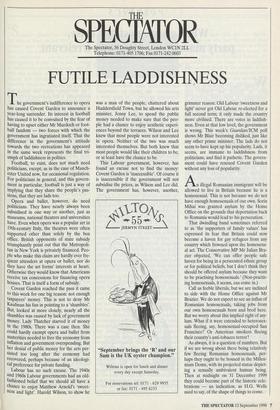SPECt E AT'OR The Spectator, 56 Doughty Street, London WC1N 2LL Telephone:
0171-405 1706; Fax 0171-242 0603
FUTILE LADDISHNESS
The government's indifference to opera has caused Covent Garden to announce a year-long surrender. Its interest in football has caused it to be convulsed by the fear of having to upset either Mr Murdoch or foot- ball fandom — two forces with which the government has ingratiated itself. That the difference in the government's attitude towards the two recreations has appeared in the same week represents the final tri- umph of laddishness in politics.
Football, to exist, does not much need Politicians, except, as in the case of Manch- ester United now, for occasional regulation. For politicians in general, and this govern- ment in particular, football is just a way of implying that they share the people's pas- sions, that they are lads too.
Opera and ballet, however, do need politicians. They have nearly always been subsidised in one way or another, just as museums, national theatres and universities have. Even when opera was a popular art in 19th-century Italy, the theatres were often supported other than solely by the box office. British opponents of state subsidy triumphantly point out that the Metropoli- tan in New York is privately financed. Peo- ple who make this claim are hardly ever fre- quent attenders at opera or ballet, nor do they have the art forms' interests at heart. Otherwise they would know that Americans receive tax concessions for financing opera houses. That is itself a form of subsidy.
Covent Garden reached the pass it came to this week for one big reason: not enough taxpayers' money. This is not to deny Mr Kaufman his fun in pointing to a 'shambles'. But, looked at more closely, nearly all the shambles was caused by lack of government money. Lady Thatcher starved it of money in the 1980s. There was a case then. She could hardly exempt opera and ballet from austerities needed to free the economy from inflation and government overspending. But her denial of public money for the arts per- sisted too long after the economy had recovered, perhaps because of an ideologi- cal preference for private funding. Labour has no such excuse. The 1940s and 1960s Labour governments had an old- fashioned belief that we should all have a chance to enjoy Matthew Arnold's 'sweet- ness and light'. Harold Wilson, to show he was a man of the people, chattered about Huddersfield Town, but he allowed his arts minister, Jenny Lee, to spend the public money needed to make sure that the peo- ple had a chance to enjoy aesthetic experi- ences beyond the terraces. Wilson and Lee knew that most people were not interested in opera. Neither of the two was much interested themselves. But both knew that most people would like their children to be, or at least have the chance to be.
This Labour government, however, has found an excuse not to find the money: Covent Garden is 'inaccessible'. Of course it is inaccessible if the government will not subsidise the prices, as Wilson and Lee did. The government has, however, another, grimmer reason: Old Labour 'sweetness and light' never got Old Labour re-elected for a full second term; it only made the country more civilised. There are votes in laddish- ness. Even at that low level, the government is wrong. This week's GuardianlICM poll shows Mr Blair becoming disliked, just like any other prime minister. The lads do not seem to have kept up his popularity. Lads, it seems, are immune to laddishness from politicians, and find it pathetic. The govern- ment could have rescued Covent Garden without any loss of popularity.
An illegal Romanian immigrant will be allowed to live in Britain because he is a homosexual. This is not because we do not have enough homosexuals of our own. Sorin Mihai was granted asylum by the Home Office on the grounds that deportation back to Romania would lead to his persecution.
That dwindling band sometimes referred to as 'the supporters of family values' has expressed its fear that Britain could now become a haven for gay refugees from any country which frowned upon the homosexu- al act. The Conservative MP Mr Julian Bra- zier objected, 'We can offer people safe haven for being in a persecuted ethnic group or for political beliefs, but I don't think they should be offered asylum because they want to be practising homosexuals.' (Non-practis- ing homosexuals, it seems, can come in.) Call us feeble liberals, but we are inclined to side with the Home Office against Mr Brazier. We do not expect to see an influx of Romanian homosexuals, taking jobs from our own homosexuals born and bred here. But we worry about this implied right of asy- lum. What if it were extended to heterosex- uals fleeing, say, homosexual-occupied San Francisco? Or American smokers fleeing their country's anti-tobacco terror?
As always, it is a question of numbers. But if we are wrong about there being relatively few fleeing Romanian homosexuals, per- haps they ought to be housed in the Millen- nium Dome, with its projected statue depict- ing a sexually ambivalent human being. Then at midnight on 31 December 1999 they could become part of the historic cele- brations — an indication, as H.G. Wells used to say, of the shape of things to come.


































































 Previous page
Previous page